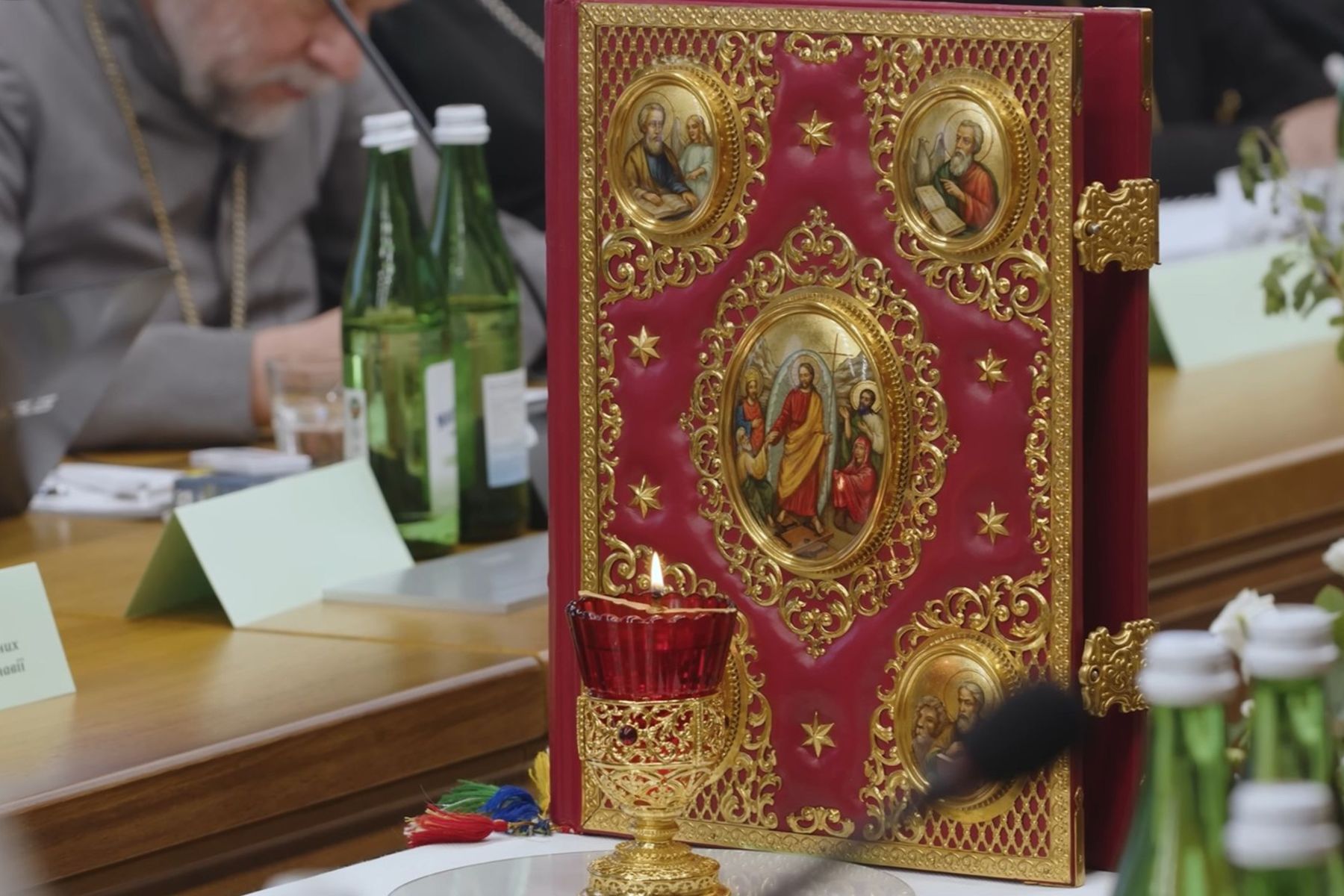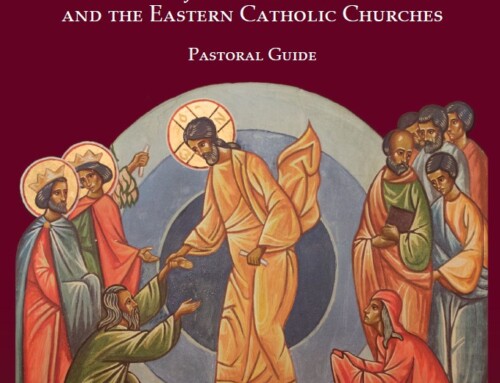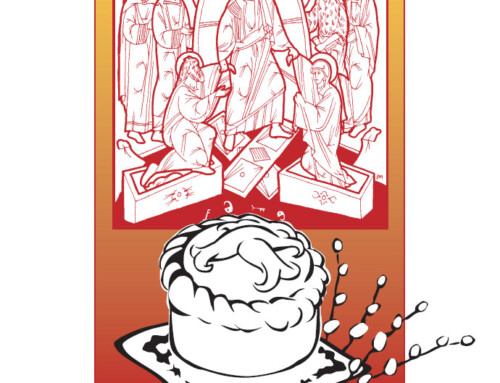«The Gospel is the Power of God to Salvation for Everyone who Believes» (Rm 1:16): Pastoral Letter of the Synod of Bishops of the Ukrainian Greek-Catholic Church 2024 to the Clergy, Religious and Lay Faithful of the UGCC.
Вих. ВА 24/207 ENG
«THE GOSPEL IS THE POWER OF GOD TO SALVATION
FOR EVERYONE WHO BELIEVES» (Rm 1:16)
Pastoral Letter of the Synod of Bishops
of the Ukrainian Greek-Catholic Church 2024
To the Clergy, Religious and Lay Faithful of the UGCC
While they were talking and discussing together,
Jesus himself drew near and went with them (Lk 24:15).
Dear Brothers and Sisters in Christ!
We, the bishops of the Ukrainian Greek-Catholic Church from Ukraine and various parts of the world, have gathered at the feet of the miraculous icon of the Mother of God in Zarvanytsya from July 2 to 12 for the annual Synod. For the first time since the beginning of the full-scale invasion, all the bishops of our Church came to Zarvanytsya, to be together with their faithful, to share their pain and trepidations. Every day we offered up prayers for a just peace and an end to a war that was criminally and insidiously initiated by Russia against our people and a free Ukraine. In the days when our Synod was held, Russian brutality crossed another line: in order to break our will to resist, the enemy attacked the most vulnerable — sick children from all across the country being treated in the central children’s hospital in Kyiv. But despite this shameful plan, we witnessed solidarity and kindness—thousands of people sifted through the ruins of destroyed buildings, sheltered the injured, and within a few hours collected funds for the reconstruction of the hospital. In this tragedy, we saw all a person is capable of—the most terrible and the most magnificent. We saw that at the core of our will to resist there is humanity and empathy.
Despite the terrible context, we sought answers—on how to preach the Gospel of Christ in this time of trials and suffering, on how to evangelize, how to be messengers of hope for our neighbors and the outside world. This was the main topic of our Synod.
Our people continues its pilgrimage to full freedom from enslavement by the empire of evil which, first in the form of tsarist and communist Russia, and now in the form of Putin’s criminal regime, denied and continues to deny the very right of Ukrainians to exist and to build their own existence in the light of Divine truth and Divine law. We do not forget and do not let the world forget that Russian occupation brings death and crimes against humanity. What we have is recurring genocide. What we have are recurrent prohibitions of our Church which nonetheless rises again and again with its people.
In the suffering of Ukrainians, the earthly journey of our Savior is revealed once again, a Savior whom enemies hated without cause (cf. Jn 15:25), betrayed out of envy (cf. Mk 15:10), tortured with fierce malice (cf. Jn 19:3) and mercilessly killed on the cross (Mk 10:34). Foretelling his passion, Jesus Christ gave his disciples an infallible promise of resurrection: «The Son of Man will be delivered over to the chief priests and the scribes, and they will condemn him to death and deliver him over to the Gentiles. And they will mock him and spit on him, and flog him and kill him. And after three days he will rise» (Mk 10:33–34). When the apostles heard these words, they hardly realized what they would have to go through, and perhaps they thought more about the promise of the Kingdom than about the Teacher’s death. Thus, on the day of Good Friday, it seemed to each of them that it was already the end. Even after initial reports of the Resurrection, the two disciples on the road to Emmaus are distressed, they are assailed by numerous doubts and questions.
In the terrible conditions of war, within Ukrainian society there are also many doubts and questions which we, pastors, cannot ignore, even though we do not have an exhaustive answer to them. Often the prayer of our people resembles the cry of the psalmist who experiences loneliness and injustice.
We must discover for ourselves the presence of Christ in our pilgrimage as the two disciples from Emmaus experienced (cf. Lk 24:13–23). Confused and tired, they allowed their hearts to be enlightened and warmed by the word of God that came from the mouth of the Risen One, and then they recognized Him in the breaking of bread. In the same way, we, as a Church and a people, are called to be enlightened by God’s word of hope, truth, and life, and to strengthen ourselves with heavenly food — the most holy Body and Blood of our Savior. In them, the Lord gives us the pledge of victory and eternal life over which death no longer has any power because we carry within us the deposit of resurrection according to Christ’s infallible promise: «Whoever eats my flesh and drinks my blood has eternal life, and I will raise him up on the last day» (Jn 6:54).
Beloved in Christ, let us be strengthened by the Word of God, for in it is the Spirit and life (cf. Jn 6:63), the source and pledge of our hope! When we hear sirens, when streams of disheartening news come at us from everywhere, when despondency, fear, and hopelessness surround us, let us take the Holy Scriptures in our hands, pour out our sorrows and pain before God, and together look for light and the necessary strength. After all, St. Paul assures us, and the thousand-year experience of our people and our unyielding martyr-Church confirms that «the Gospel is the power of God to salvation for everyone who believes» (Rm 1:16).
The power of God, like the life-giving breath of the risen Savior, revives us every time the Church proclaims the Gospel of Christ to each person today. This proclamation (kerygma) vividly makes the Lord’s action present in our daily reality. This living word of the Good News about Christ’s Resurrection, God’s love for us, the forgiveness of sins, and the communion of eternal life conveys to everyone who believes the very Source of our hope and the power of Christian perseverance. It [this proclamation] informs us not of past works of God, but of the fact that He acts in relation to each of us personally this very day by the power and action of the Holy Spirit. When the enemy sows death and wants to imprison us in his kingdom of hopelessness and despair, the Church of Christ in its proclamation brings to each person who believes life and resurrection, hope of salvation, and leads them to communion of the Holy Mysteries. That is why spreading this Word of the Gospel into all dimensions of our personal and social life, so that its power might permeate contemporary culture, and its light transfigure the way of human thinking and acting (evangelization), and transmitting the faith to all who have not yet come to know Christ, is the core mission of all His disciples — our contemporaries. It is about us, especially those who are called to serve the Word of God, that St. Paul the Apostle speaks: «For if I preach the gospel, that gives me no ground for boasting. For necessity is laid upon me. Woe to me if I do not preach the gospel!» (1 Cor 9:16).
We call on all the faithful of our Church to read God’s Word daily and meditate on it in parish bible apostolate communities. Let our families be the first place where the treasure of faith is passed on to new generations of Christians, where praying together and the reading of the Holy Scriptures are practiced, and where different generations strengthen one another through a witness of faith and through patient and faithful love. However, let us remember that God’s Word always leads to the partaking of the Holy Mysteries and is fulfilled in the Liturgy of Christ’s Church in the same way that the hearts of the disciples burned on the way to Emmaus, when Jesus spoke to them on the way, but they could only recognize Him in the breaking of bread—in partaking of His life and resurrection in the Mystery of the Eucharist (Lk 24:35).
The consequences of Russian shelling are obvious, in particular in the form of Ukrainians being killed or maimed. However, there are wounds on the body of our people that we hear less about in the daily news. We speak of the burden that has fallen on Ukrainian families who bury their dead, care for the wounded, search for the missing, and share the post-traumatic syndrome of veterans. Statistics of divorces, of broken families, of family members scattered around the world—all represent threats to our society. Therefore, we continue striving to give special pastoral attention to our families. We call on the parish clergy and the entire community of the faithful to care for families who have lost loved ones, and for everyone who is suffering near us, who feels alone or abandoned. Here it is appropriate to recall the words of Pope Benedict XVI who emphasized: «The Church is God’s family in the world. In this family no one ought to go without the necessities of life… The parable of the Good Samaritan remains as a standard which imposes universal love towards the needy whom we encounter „by chance’ (cf. Lk 10:31), whoever they may be. Without in any way detracting from this commandment of universal love, the Church also has a specific responsibility: within the ecclesial family no member should suffer through being in need“ (Encyclical Deus caritas est, 25).
Having deep wounds, which the war has already inflicted on us and inflicts each day on our soul and body, «let us then with confidence draw near to the throne of grace, that we may receive mercy and find grace for help in time of need» (cf. Heb 4:16). In particular, let us often approach the Sacrament of Confession and not hesitate to bring all our wounds, ailments, and diseases to the merciful Lord — the Physician of souls and bodies — in the Sacrament of Anointing. It is in these Sacraments, which the Church calls the Sacraments of healing, that our Savior and Lord wants to embrace us with his merciful love and pour out the healing balm of his grace on our aching souls and hearts. Let us allow Him to do it! Let us allow Him to heal us daily, overcoming the effects of war with the power of God’s love, and restoring us to new hope and new life.
This new life is the life of the crucified and risen Christ in us, which reveals itself to the world in our acts of merciful and compassionate love. Therefore, in the midst of all the trials and sufferings of our days, let us not give up, but let us continue to do good to everyone, and above all to «those who are of the household of faith» (cf. Gal 6:10), to our suffering brothers and sisters in our native lands, in Ukraine. We repeat the call from our pastoral letter of last year, which should remain a guide for us in our daily decisions and actions: «Do not be overcome by evil, but overcome evil with good!» (Rm 12:21). If each of us does at least one concrete good deed every day, we will steadily step by step bring closer the victory of God’s truth.
We want to express our deep gratitude to all those who by their very being are already showing to the world the life of the risen Lord in our people: our defenders, volunteers, doctors and chaplains, who are united with Christ in love and self-sacrifice, and provide an example of the highest love, which lays down its life for its friends (cf. Jn 15:13).
We hasten with words of Christian comfort to all those who are mourning their dead or searching for those missing without trace, and we assure them of our prayerful closeness. We pray for the wounded and traumatized, for the liberation of those in captivity and forcibly deported, for all those under temporary occupation, and for our brothers and sisters scattered across the globe.
We thank our brothers and sisters in faith and all people of good will throughout the world who remember us, who support us, and who pray with us and for us, being confirmed together with us in Paschal faith and hope. Upon all we invoke God’s boundless mercy, God’s strength, and the intercession of our Heavenly Mother — the Most Holy Theotokos.
Remembering the great gift of Baptism for our people, we strive to renew our promises of fidelity to Christ, and, at the same time, to strengthen our Paschal faith and hope. As his disciples, as children of the resurrection, we firmly believe that our «third day» will certainly come—the day of resurrection, the day of victory of truth and love over sin, hatred and hell, that the bright dawn of our Ukrainian Easter will come!
Invigorated by this faith and Christian hope, we are already now, in the midst of trials and suffering, proclaiming the good news of salvation to the whole world in the words of the Apostle of the Nations: «We are afflicted in every way, but not crushed; perplexed, but not driven to despair; persecuted, but not forsaken; struck down, but not destroyed; always carrying in the body the death of Jesus, so that the life of Jesus may also be manifested in our bodies. For we who live are always being given over to death for Jesus’ sake, so that the life of Jesus also may be manifested in our mortal flesh» (2 Cor 4:8–11).
May the Divine Spirit continue to guide and revive us, may he make us instruments of God’s love and God’s peace, and heralds of hope and life! May the Most Holy Theotokos, and the saints and righteous of the Ukrainian land intercede for us on this path!
May the blessing of the Almighty God, the Father, and the Son, and the Holy Spirit, descend upon our people and abide with us all forever!
On behalf of the Synod of Bishops
Ukrainian Greek-Catholic Church
† SVIATOSLAV
Given in Kyiv,
at the Patriarchal Cathedral of the Resurrection of Christ,
on the day of Saint Volodymyr, named Basil in Holy Baptism,
Grand Prince of Kyiv, Equal-to-the-Apostles,
On the 15th day of July in the 2024th year of our Lord
We instruct parish clergy to read this Pastoral Letter to the faithful after every Divine Liturgy on Sunday, August 4 of this year.



